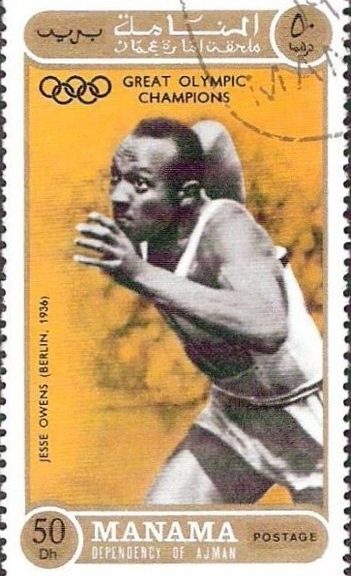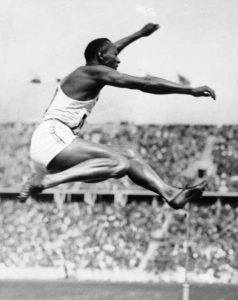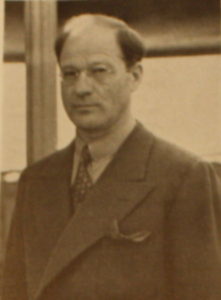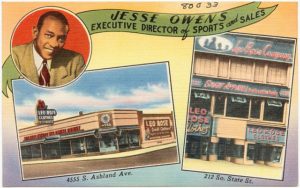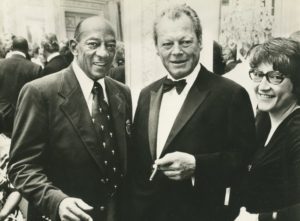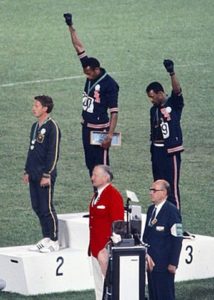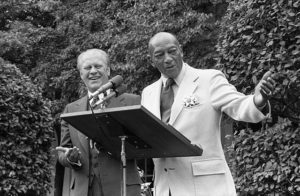Adolf Hitler intended the 1936 Berlin Olympics as a coming out party for his Aryan Master Race. African-American Jesse Owens crashed the venue by winning four gold medals.
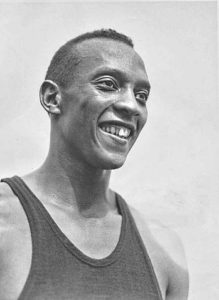
At the Penn Relays, he won the long jump and the 100 meter dash. Unfortunately for Eulace Peacock, the sprinter completely tore his hamstring during a preliminary heat, an injury so severe that Peacock was unable to make the 1936 Olympic Games.
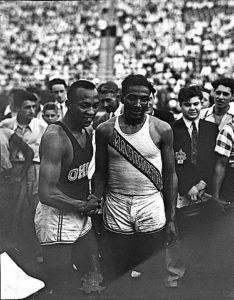
Owens qualified easily, winning the 100 and 200 meter sprint and the long jump competition at the Olympic trials at Randall’s Island. His chief American competition came from Ralph Metcalfe in the 100 and Mack Robinson in the 200, Robinson the older brother of future Brooklyn Dodger, Jackie Robinson. Eighteen black Americans qualified for the US Olympic team, two of them women, almost four times the number of African-American competitors at the 1932 Olympic games in Los Angeles.
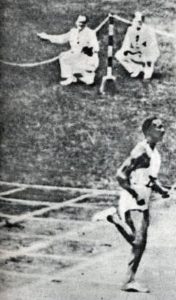
For a gold medal in the 100 meters, Jesse Owens would have to win four consecutive races, but the competition in Monday’s first two heats was minimal, several sprinters in the Big Ten much tougher competition. Jesse cruised easily to victory, in the first heat by seven yards and the quarter finals by four yards, breaking his own world record in a time of 10.2 seconds. While Owens victories were not a surprise, what was astonishing was the response of the crowd when his name was announced and after he crossed the tape in first place. Anticipating that a German crowd politically attuned to the current Nazi master race theories would ignore or even vent hostility toward a Black American, instead the massive crowd roared their approval.
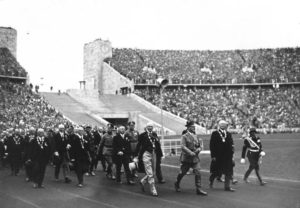
Elsewhere in the stadium, Two German athletes were generating their own excitement. Hans Woelke and Ottilie “Tilly” Fleischer won gold in the men’s shot put and women’s discus, respectively, the first track and field Olympic gold medals ever won by Germany. Afterwards, they were summoned to Hitler’s personal box, where both were personally congratulated by Hitler and Hermann Goering. Later in the afternoon, when three Finns swept the medals in the 10,000 meters distance race, they were also invited to Hitler’s box and congratulated.
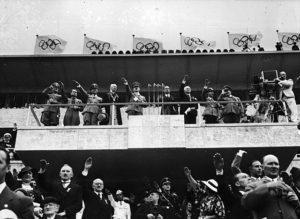
But by the time the event concluded, and with the weather getting progressively colder with rain starting to fall, Adolf Hitler left the arena before the high jump medals ceremony and without a personal invitation to the black American Johnson. This did not go unnoticed especially by the American press who focused the first day’s coverage on the perceived snub. It also was noticed by Henri de Baillet-Latour, the President of the International Olympic Committee, who was hoping to lower the volume on politics and did not want Hitler to become the focal point of the current games. He is said to have either forbidden Hitler to personally congratulate winners or to have told Hitler that he needed to congratulate every winner, regardless of race or country of origin. The most popular interpretation is that Hitler, figuring that at least one black man, Jesse Owens was a shoe in to win at least one medal, then decided to stop publicly congratulating any of the winners.
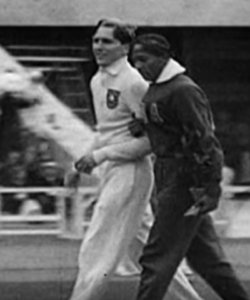
Later that afternoon, at 4:30 he participated in the long jump semi-final that served to eliminate ten of the remaining sixteen competitors. Both Owens and Luz Long broke the existing Olympic record, jumping well over 25 feet to the delight of the crowd and setting up a climactic final. Owens faulted on his first jump of the finals and his German competitor regressed to 25 feet, four inches but on his second jump Long pressed Owens to the limit with a leap of 25 feet, 10 inches. Owens responded like a true champion establishing a new Olympic record with a jump of 26 feet. When Long faulted on his third and last try, Owens had won his second gold. Not to leave anything on the table, his final attempt measured 26 feet, 5.5 inches another Olympic record. Long was the first to congratulate him after the American landed in the sand, the crowd also roaring over this exceptional feat. Together, the two athletes walked on the track arm in arm, in clear view of the spectators including Adolf Hitler.
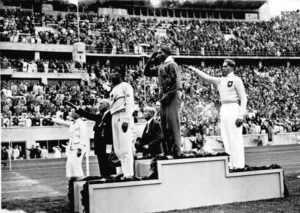
But, after sharing this moment of sportsmanship, Long was conveyed to a private room under the stands where he was personally greeted and congratulated by Hitler and his entourage. There would no such interaction by Hitler with Jesse Owens or any other black member of the American contingent. Hitler did also privately meet and greet with Helen Stephens, the 18 year old American phenomenon who won the Womens 100 meters, underlining Hitler’s apparent desire to ignore any success on the part of Black Americans, even unofficially.
Podcast: Play in new window | Download
Subscribe: RSS

